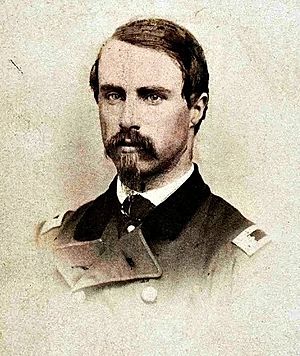Thomas W. Hyde facts for kids
Quick facts for kids
Thomas W. Hyde
|
|
|---|---|
 |
|
| Born | January 16, 1841 Florence, Italy |
| Died | December 14, 1899 (aged 58) Fort Monroe, Virginia |
| Place of burial | |
| Allegiance | United States of America Union |
| Service/ |
United States Army Union Army |
| Years of service | 1861 - 1865 |
| Rank | |
| Unit | |
| Commands held | 1st Maine Veteran Volunteer Infantry Regiment |
| Battles/wars | American Civil War *Second Battle of Bull Run *Battle of Antietam *Battle of Gettysburg |
| Awards | |
| Other work | Senator, Mayor, Founder of Bath Iron Works |
Thomas Worcester Hyde (born January 16, 1841 – died December 14, 1899) was an important figure in American history. He was a brave soldier during the American Civil War. He also became a state senator in Maine. Later, he started a very famous company called Bath Iron Works. This company builds many ships for the United States. Thomas Hyde also wrote two books about his time in the war.
Contents
Early Life and Education
Thomas Hyde was born in Florence, Italy. His parents were from Bath, Maine. He went to Bowdoin College and graduated in 1861. After that, he studied at Chicago University.
Military Service in the Civil War
Thomas Hyde joined the Union Army on April 2, 1861. He started as a major in the 7th Maine Volunteer Infantry Regiment. This was at the very beginning of the American Civil War.
Rising Through the Ranks
Hyde quickly showed his skills as a soldier. In 1863, he became an Assistant Inspector General. He worked with the Sixth Corps of the Army of the Potomac. This was a very important group of soldiers. He was promoted to lieutenant colonel in December 1863.
In 1864, he became the provost marshal general for the Sixth Corps. This job meant he helped keep order and discipline. Later that year, he became a colonel. He then commanded a brigade of soldiers.
Key Battles and Achievements
Thomas Hyde fought in many major battles of the Civil War. He was at the Second Battle of Bull Run. He also fought in the Battle of Antietam. For his bravery at Antietam, he later received the Medal of Honor. This is the highest award for military heroism.
He was also present at the famous Battle of Gettysburg. This was a turning point in the war. Hyde was even there when Confederate General Robert E. Lee surrendered. This happened at Appomattox Court House, Virginia in 1865. Hyde left the army on June 28, 1865.
Special Military Honors
After the war, Thomas Hyde received special honors. In 1866, he was given the honorary rank of brevet brigadier general. This rank recognized his excellent service. In 1869, he received another honorary rank. He became a brevet major general. This was one of the last such awards for Civil War service.
Life After the War
After his military career, Thomas Hyde continued to serve his country. He became a successful politician and businessman.
Political Career
Starting in 1873, Hyde served three terms in the Maine Senate. He was even the president of the Senate twice. In 1878, he became the mayor of Bath, Maine.
Founding Bath Iron Works
In 1884, Thomas Hyde started a company called Bath Iron Works. He became its general manager in 1888. This company became very important for shipbuilding in the United States. It has built more than 425 ships. Many of these ships were for the United States Navy.
Other Business Ventures
In 1894, he became the president of the Boston Elevated Railway Company. This company managed a railway system.
Books Written by Hyde
Thomas Hyde wrote two books about his experiences. These books share his memories of the Civil War.
- Following the Greek Cross (published in 1894)
- Recollections of the Battle of Gettysburg (published in 1898)
Death
Thomas Hyde passed away on November 15, 1899. He died at Fort Monroe, Virginia, after a short illness. He was buried in Oak Grove Cemetery in Bath, Maine.

